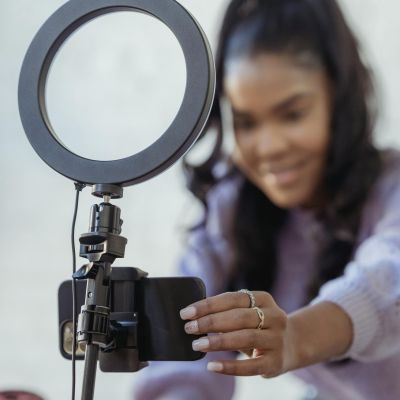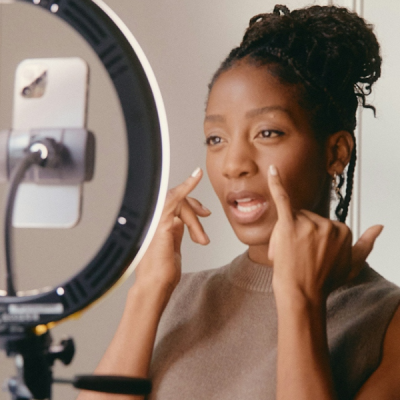Meta has recently taken a controversial step by altering the names of themes referencing the LGBTQIAPN+ community on Brazilian Messenger, sparking discussions about its commitment to the community.
The Danger of Pink-Washing for Companies
Meta has recently taken a controversial step by altering the names of themes referencing the LGBTQIAPN+ community on Brazilian Messenger, sparking discussions about its commitment to the community.
In May 2022, the company launched themes on Messenger with pride symbols and representations of LGBTQIAPN+ flags as part of its marketing actions for Pride Month. However, in January 2024, Meta made a significant change in Brazilian devices: the names of the themes were altered, with “pride” now being called “rainbow,” the transgender flag renamed to “cotton candy,” and other LGBTQIAPN+ related themes reformulated with more generic names.
These changes raise a question: If in 2022 the company used these themes as part of its communication and marketing efforts, what is the true meaning behind this sudden shift?
The name change has only been implemented on part of the devices so far, while others still display the old names. While it is unclear how this will evolve, we couldn’t miss the opportunity to use it as a hook to raise a much broader issue.
Beyond the news at hand, it is important to understand the impact of actions like these on brands and the relevance of positioning authentically on essential issues such as diversity, equity, and inclusion (DEI), without falling into pink-washing.
What is Pink-Washing and Why Does It Affect Brands?
Defining Pink-Washing
Pink-washing is a term that describes when a brand publicly adopts the LGBTQIAPN+ cause superficially as a marketing strategy to attract consumers, without truly integrating inclusion and respect for diversity into its business practices.
The Danger of Superficial Marketing
Supporting the LGBTQIAPN+ cause should not be limited to aesthetics or displaying symbols during specific events like Pride Month. Brands that engage in occasional actions and empty rhetoric risk losing credibility and trust from the public. A true commitment to diversity must be genuine and constant.
How to Avoid Pink-Washing?
- Integrate DEI into Corporate Culture
To combat pink-washing, brands need to integrate diversity and inclusion as core values within their corporate culture. This includes clear anti-discrimination policies, training on prejudice and microaggressions, and leadership that exemplifies these values.
Transparency and Accountability
Transparency is essential for brands that commit to the LGBTQIAPN+ cause. They need to account for their actions by providing clear metrics on how they are promoting diversity and inclusion. This creates a positive impact and strengthens trust with their audience.- Avoid Superficial Marketing
True inclusion goes beyond superficial visual marketing. Brands must ensure that their actions are genuine and consistent, supported by LGBTQIAPN+ rights organizations and the implementation of inclusive policies that respect all gender identities and sexual orientations. - Listen to the Community
Before launching campaigns or actions, brands should listen to the LGBTQIAPN+ community. This ensures that their actions are authentic and aligned with the real needs of the community the brand seeks to support.
Why Authenticity is Crucial for Brands?
→ Real Commitment to Diversity
Supporting the LGBTQIAPN+ cause authentically is not a strategy to boost sales or create trends. Brands that genuinely commit to DEI earn respect, trust, and loyalty, which pink-washing can never achieve.
→ The Positive Impact of Authentic Brands
Brands that integrate diversity, equity, and inclusion as core values not only gain respect but also play an important role in social transformation. They contribute to a more just, equal, and respectful world for all people.The LGBTQIAPN+ acronym is used to represent various gender identities and sexual orientations. Each letter in the acronym has a specific meaning, reflecting the diversity within the community:
L: Lesbians – Women who are attracted to other women.
G: Gays – Men who are attracted to other men.
B: Bisexuals – People attracted to more than one gender.
T: Transgender – People who do not identify with the gender assigned at birth.
Q: Queer – Individuals whose gender or sexual expression does not fit traditional gender or sexual orientation norms.
I: Intersex – People with biological characteristics that do not fit typical definitions of male or female.
A: Asexual, Agender, or Aromantic – Individuals who do not experience sexual or romantic attraction.
P: Pansexual and Polysexual – People attracted to others regardless of gender.
N: Non-binary – Individuals who do not identify exclusively as male or female.
+: Represents other identities and orientations not specified in the acronym.June was chosen to celebrate LGBTQIAPN+ Pride in memory of the 1969 Stonewall Rebellion, when patrons of the Stonewall Inn, a gay bar in New York, faced police violence. The uprising marked a pivotal moment in the fight for LGBTQIAPN+ rights, and since then, June has become the month for various events and marches celebrating sexual and gender diversity.The term pink-washing describes when brands and companies approach the LGBTQIAPN+ cause superficially, especially during Pride Month, but fail to adopt inclusion policies within their organizations. Companies capitalize on the popularity of the movement for marketing purposes, using symbols like the rainbow flag without showing a real commitment to diversity and inclusion in the long term.Brands should ensure that their actions and internal values truly reflect their commitment to diversity, equity, and inclusion (DEI), going beyond short-term marketing campaigns like those during Pride Month. Continuous actions and an inclusive workplace environment are essential to avoid pink-washing.














